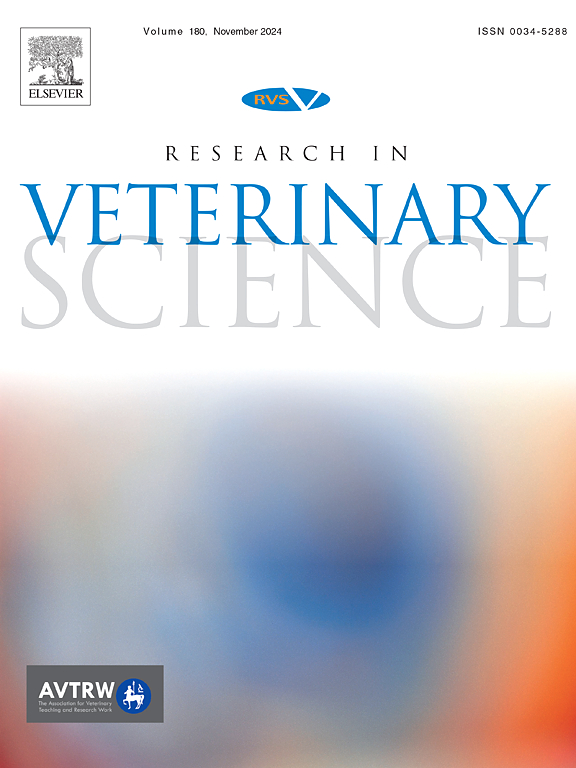白藜芦醇对健康犬和特应性犬外周血单核细胞体外效应的研究
IF 2.2
3区 农林科学
Q1 VETERINARY SCIENCES
引用次数: 0
摘要
犬特应性皮炎(AD)是一种常见的皮肤病。目前有许多治疗方法可以减轻炎症和瘙痒。然而,这些治疗方法都有副作用、疗效滞后期长或费用高昂等问题。天然植物提取物被认为是传统消炎药和止痒药的更安全的替代品。白藜芦醇因其多种有益特性而被视为一种新的可能替代品。这项研究的目的是评估白藜芦醇对从健康狗和特应性私人饲养狗身上采集的外周血单核细胞(PBMC)的体外效应。从 9 只健康狗和 11 只特应性狗身上采集的 PBMC 被分离出来,并暴露于四种浓度(1.5-9 μg/mL)的白藜芦醇中,无论是否有植物血凝素刺激。24 小时后,对细胞毒性、宿主防御肽(HDPs)、氧化应激(过氧化氢酶和超氧化物歧化酶)和促炎细胞因子进行了评估。在任何实验条件下,两组均未观察到细胞毒性。只有在暴露于低浓度白藜芦醇后,健康的 PBMC 中的过氧化氢酶才会增加(p ≤ 0.03)。白藜芦醇对犬的 HDPs 没有任何影响。与基线相比,接触 9 μg/mL 白藜芦醇后,未刺激健康(p = 0.029)和刺激特应性(p = 0.0075)PBMC 的单核细胞趋化蛋白-1 和白细胞介素-6 显著降低。总之,这些数据证实,在测试浓度下,白藜芦醇对健康和特应性 PBMC 总体上没有细胞毒性。不过,在测试的浓度下,白藜芦醇对 HDPs 和促炎细胞因子的分泌影响很小。本文章由计算机程序翻译,如有差异,请以英文原文为准。
Investigation on the in vitro effects of resveratrol on peripheral blood mononuclear cells harvested from healthy and atopic dogs
Canine atopic dermatitis (AD) is a common skin disease. Many therapeutic options are available to decrease inflammation and ameliorate pruritus. However, those treatments are associated with side effects, a long lag phase for efficacy, or high expense. Natural plant extracts have been identified as possible, safer alternatives to traditional anti-inflammatory and antipruritic drugs. Resveratrol has been revisited as a new, possible alternative for its numerous beneficial properties. The purpose of this study was to evaluate the in vitro effects of resveratrol on peripheral blood mononuclear cells (PBMC) harvested from healthy and atopic privately-owned dogs.
The PBMC harvested from nine healthy and 11 atopic dogs were isolated and exposed to four concentrations (1.5-9 μg/mL) of resveratrol both with or without phytohemagglutinin stimulation. After 24 h cytotoxicity, host defense peptides (HDPs), as well as oxidative stress (catalase and superoxide dismutase), and pro-inflammatory cytokines were assessed. Cytotoxicity was not observed in either group under any experimental conditions. An increase in catalase was only seen in healthy PBMC after exposure to low concentrations of resveratrol (p ≤ 0.03). Resveratrol did not show any effect on canine HDPs. Compared to baseline, there was a significant reduction in monocyte chemotactic protein-1 and interleukin-6 after exposure to 9 μg/mL of resveratrol in unstimulated healthy (p = 0.029) and stimulated atopic (p = 0.0075) PBMC. In conclusion, these data confirm the overall lack of cytotoxicity of resveratrol on healthy and atopic PBMC at the tested concentrations. However, at the concentrations tested, there was only a minimal effect of resveratrol on the secretion of HDPs and pro-inflammatory cytokines.
求助全文
通过发布文献求助,成功后即可免费获取论文全文。
去求助
来源期刊

Research in veterinary science
农林科学-兽医学
CiteScore
4.40
自引率
4.20%
发文量
312
审稿时长
75 days
期刊介绍:
Research in Veterinary Science is an International multi-disciplinary journal publishing original articles, reviews and short communications of a high scientific and ethical standard in all aspects of veterinary and biomedical research.
The primary aim of the journal is to inform veterinary and biomedical scientists of significant advances in veterinary and related research through prompt publication and dissemination. Secondly, the journal aims to provide a general multi-disciplinary forum for discussion and debate of news and issues concerning veterinary science. Thirdly, to promote the dissemination of knowledge to a broader range of professions, globally.
High quality papers on all species of animals are considered, particularly those considered to be of high scientific importance and originality, and with interdisciplinary interest. The journal encourages papers providing results that have clear implications for understanding disease pathogenesis and for the development of control measures or treatments, as well as those dealing with a comparative biomedical approach, which represents a substantial improvement to animal and human health.
Studies without a robust scientific hypothesis or that are preliminary, or of weak originality, as well as negative results, are not appropriate for the journal. Furthermore, observational approaches, case studies or field reports lacking an advancement in general knowledge do not fall within the scope of the journal.
 求助内容:
求助内容: 应助结果提醒方式:
应助结果提醒方式:


